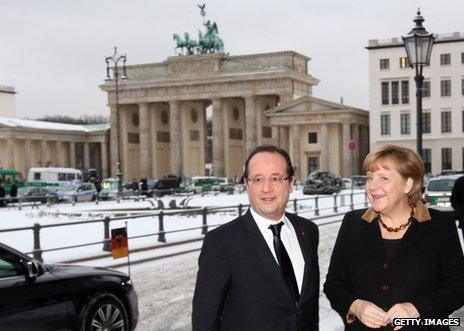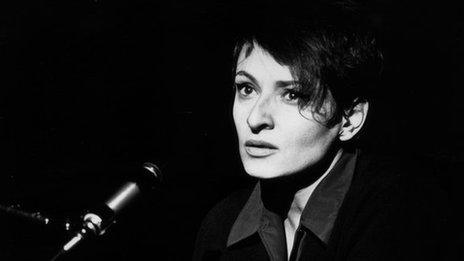France and Germany mark Elysee pact's 50th anniversary
- Published

Mr Hollande and Mrs Merkel posed in front of the Brandenburg Gate
France and Germany are marking the 50th anniversary of a treaty that helped to reconcile the two former foes.
French President Francois Hollande told a joint session of their parliaments in Berlin that a generation had grown up knowing only peace and democracy.
But he warned that they faced "an economic and social crisis of unprecedented duration".
German Chancellor Angela Merkel said the two states would work on deeper economic and fiscal integration.
The Elysee Treaty was signed by Charles de Gaulle of France and Germany's Konrad Adenauer on 22 January 1963.
Despite ups and downs in the relationship, Berlin and Paris have been key shapers of the European Union.
De Gaulle described Europe as "a coach and horses, with Germany the horse and France the coachman", and the co-operation between the two nations has been the foundation stone of the European project, the BBC's Europe editor Gavin Hewitt says.
'Working chemistry'
At a joint news conference, France's Socialist president addressed his political differences with Germany's conservative leader.
"It has not escaped you that we do not belong to the same political family," he said.
"Despite that, if you look back at the past eight months, I'm very happy with what France and Germany have been able to accomplish to get the eurozone out of its crisis.
"If you look at the results, it's clear we're on the same wavelength."
Mrs Merkel replied: "It may be our best-kept secret that the chemistry actually works."
The two leaders also met figures from the arts world at the French embassy in Berlin.
Wim Wenders, the German film director, recalled his links to France: "I am a child of this friendship even if it was more exciting when I was young.
"My first car was a [Citroen] 2CV and I studied in Paris."
Today, the 67-year-old added, "there is a certain indifference but that doesn't surprise me after 50 years of marriage".
To celebrate what has been described as a festival of friendship, France and Germany are issuing stamps, coins and other items of memorabilia.
French flags are flying beside those of Germany in Berlin.
Differences
However, the two countries remain at odds on several issues, including how to deal with the eurozone crisis.
President Hollande - who is pushing for fresh spending to bolster growth - believes that the Germans are wrong to place such emphasis on austerity and cutting deficits.
On Mr Hollande's side there is also still bitterness that Chancellor Merkel backed Nicolas Sarkozy so openly during last year's French presidential elections, our editor says.
The ongoing crisis in Mali is also likely to test the two countries' relationship.
While Paris has deployed troops in the west African nation to halt the advance of Islamist insurgents, Berlin has been reluctant to be drawn deeply into the conflict.
- Published21 January 2013
- Published22 January 2013

- Published24 September 2015